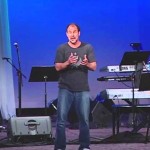We run our website the way we wished the whole internet worked: we provide high quality original content with no ads. We are funded solely by your direct support. Please consider supporting this project.
Doesn’t Psalms 139:16 refute the Open View of the future?
One of the passages most frequently cited in attempts to refute the open view of the future is Psalm 139:16. Here David says that God viewed him while he was being formed in the womb (vs. 15) and then adds:
“[Y]our eyes saw my unformed body.
All the days ordained for me
were written in your book
before one of them came to be.” (TNIV)
It is argued that this suggests that “our days are numbered” before we’re born. God knows exactly how long we’re going to live, in other words. According to this view, when someone dies (by whatever means–even murdered children!), it is right for people to proclaim: “It must have been their time to go.” Not only this, but since there are a trillion variables affecting how long a person lives, including the free decisions of other people, if God foreknows the exact time of our death, he must foreknow everything.
The argument initially looks impressive, but there are, in fact, a number of strong objections against it. Right now I’d like to address what I think is the most important one (for others, see my book, God of the Possible). In a word, the Hebrew in this passage is notoriously ambiguous, rendering a number of differing translations possible. The King James Version, for example, reads:
“Thine eyes did see my substance, yet being imperfect; and in thy book all my members were written, which in continuance were fashioned, when as yet there was none of them.”
To modernize this translation a bit, the KJV is saying, “Your eyes saw my body when it was yet unformed. You recorded in your book all my body parts which eventually came to be fashioned, and you did this before they existed (as formed body parts).
The Jewish Publication Society (JPS) translation in essence agrees with the KJV. It reads:
“Your eyes saw my unformed limbs;
they were all recorded in Your book;
in due time they were formed,
to the very last one of them.
How weighty Your thoughts seem to me, O God.”
So the Hebrew is obviously sufficiently ambiguous to allow experts to disagree on what was pre-recorded in God’s “book”. The issue of whether David’s “days” or “unformed limbs” were pre-recorded in God’s “book” must thus be settled on other grounds, the most important of which is the immediate context of the passage.
Given that this whole passage is about God’s intimate knowledge of David when he’s growing in the womb — not about God’s foreknowledge of David’s life — it seems much more reasonable to favor the translation that has God pre-recording David’s body parts. If so, David is simply expressing God’s loving care in making sure all that’s supposed to eventually be part of David’s body is in fact being formed in the womb. (By the way, it’s important to remember that we’re reading poetry here. It’s thus a mistake to try to draw out metaphysical conclusions about what this implies for babies who are born with body parts missing or deformed.)
In any event, it’s clear that Psalm 139:16 provides no strong objection to the open view of the future.
Category: Q&A
Tags: Q&A, Responding to Calvinism
Topics: Providence, Predestination and Free Will
Verse: Psalm 139
Related Reading

If salvation depends on our free choice, how are we saved totally by grace?
Question: I’m an Arminian-turned-Calvinist, and the thing that turned me was the realization that if salvation hinges on whether individuals choose to be saved or not, as Arminians and Open Theists believe, then we can’t say salvation is 100% by grace. If we have to choose for or against God, then the credit for our…

What’s the significance of Isaiah 63:8-10?
The Lord said (or “thought”) to himself, “Surely they are my people, chidren who will not deal falsely.” So, the text says, “He became their savior” (Isa. 63: 8). But “they rebelled and grieved his holy spirit.” So the Lord “became their enemy” (9-10). If the future is exhaustively settled from all eternity, how could…

Is it true you’re an “Open Theist” and that you don’t think God knows the future perfectly?
I am an “Open Theist” – though I honestly don’t care for the label, because as I’ll show, the uniqueness of this view isn’t in what it says about God but in what it says about the nature of reality. (I think it would be better to call us something like “Open Futurists.”) In any…

Sermon Clip: Does Romans 9 predestine you to Hell?
Did God predestine you to Hell? Can he even do that? In this short sermon clip, Greg Boyd talks about his own struggles when trying to understand Romans 9 which on the surface seems to imply that God determines who goes to heaven and hell. In the full sermon, Greg takes a deep look at…

How do you respond to John 6:44?
“No one can come to me unless drawn by the Father who sent me…” Calvinists sometimes argue that this passage teaches that the Father chooses and then “draws” certain people to Christ. Those who are “drawn” certainly come to Christ (John 6:37) while all who are not drawn remain in their sin. In short, this…

How do you respond to 1 Timothy 1:9?
“[God] saved us and called us with a holy calling, not according to our works but according to his own purpose and grace. This grace was given to us in Christ Jesus before the ages began…” Compatibilists sometimes appeal to this verse to support the view that God determined who would (and thus who would…
